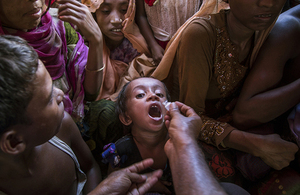UK aid to help people in Cox’s Bazar ahead of monsoon season
UK pledges fresh humanitarian support for Rohingya people living in Cox’s Bazar, Bangladesh.

A Rohingya child is given a dose of cholera vaccine in Cox's Bazar, Bangladesh, October 2017. Picture: UNICEF
The UK today (Monday May 7 2018) pledges fresh humanitarian support for the Rohingya people living in Cox’s Bazar in Bangladesh.
The support comes ahead of the looming cyclone and monsoon season, alongside help to vaccinate almost one million people against deadly cholera.
Conditions in the huge camps near the Burmese border are set to become more life-threatening in the coming weeks as the rainy season begins, which could wash away the fragile and cramped makeshift shelters that are exposed to the elements and cause fatal diseases to spread more rapidly.
From the onset of the crisis the UK has been a leading donor, and today’s announcement of an additional £70 million of humanitarian support will help ensure hundreds of thousands of persecuted Rohingya people who have fled neighbouring Burma will be better protected during this dangerous time.
UK aid is providing medication, sturdier shelters, food, clean water and support for women to give birth safely. It is also helping to support a large vaccination campaign against cholera in and around the Cox’s Bazar camps that will benefit almost a million people – made up of both Rohingya families and Bangladeshis living near the camps – which is close in size to the population of Birmingham.
Today’s UK aid is expected to provide up to:
- 200,000 people with the necessary materials to strengthen their shelters;
- 300,000 people with food assistance and clean water;
- 30,000 pregnant and breastfeeding women and 120,000 under-fives with emergency nutrition;
- 50,000 women – many of whom will give birth during the rainy season – to have access to midwifery care;
- 52,900 women and girls to have access to bathing cubicles; and
- 50,000 people to have access to healthcare services.
International Development Secretary Penny Mordaunt said:
The scale of this crisis is growing daily. With the devastating cyclone and monsoon season looming, even more lives could be lost, landslides could wipe out shelters and fatal diseases could spread.
The UK is leading the way to help vaccinate people against a deadly cholera outbreak, strengthen shelters, and provide vital food and water to vulnerable Rohingya families who have already been forced to flee their homes because of brutal violence and persecution.
The Bangladeshi Government must now use their expertise to ensure Rohingya families are saved from the dangerous rains.
Across the globe countries were quick to respond to the plight of the Rohingya people last year, but what is needed is a longer-term commitment to these vulnerable men, women and children who have suffered so much.
Today’s announcement of UK aid takes the UK’s total support for the crisis since August 2017 to £129 million and builds on the work the UK is doing throughout Bangladesh to prepare for and respond to the incoming monsoon rains.
UK aid backed vaccines have been sourced from the global cholera vaccine stockpile, funded by Gavi. The campaign, which started yesterday, is being implemented by the government of Bangladesh, working alongside the World Health Organisation.
UK-supported measles and diphtheria vaccination campaigns have also taken place. These vaccinations will provide protection against some of the most common diseases in the camps, which can be more widespread during the rainy season.
UK aid supported work on preparing the Cox’s Bazar camps for the monsoon season began in January.
At the time, the UN estimated 102,000 Rohingya men, women and children were living in areas at risk of flooding and 12,000 people were at risk from landslides.
Work is also being done to reinforce pathways through the camps, which are needed to deliver supplies and services. More than 158,000 people have also received reinforced shelter and sandbags to protect them from winds and flood water.
Ends
Notes to editors
- The UK has contributed £129 million to the crisis since 25 August 2017. As part of this, £70 million announced today is a new package of support, not previously allocated to this humanitarian programme.
- This contribution will see the UK providing 10.5% of the total budget set out in the humanitarian Joint Response Plan launched in March.
- This crisis resonates with the British public who have shown remarkable generosity raising £25.9 million for the Disasters Emergency Committee (DEC) Appeal. This includes £5 million which has been matched pound for pound by the UK Government.
- There are approximately 941,000 Rohingya people living in Cox’s Bazar camps. Of these 681,000 are new arrivals since August 2017.
- The Oral Cholera Vaccine (OCV) campaign started on 6 May. The UK is Gavi’s largest donor, contributing £1.44 billion over the 2016 to 2020 period, which equates to approximately 25% of their spend globally.
- It will target approximately 1 million people including Rohingya people and those living in the host communities. Oral Cholera Vaccine is recommended to be given in two doses. Children under five will receive two doses and adults will receive their second dose from the previous campaign conducted in November.
- Healthcare workers are also being trained to prevent, identify and treat common illnesses likely during the rainy season.
General media queries (24 hours)
Email mediateam@dfid.gov.uk
Telephone 020 7023 0600
If you have an urgent media query, please email the DFID Media Team on mediateam@dfid.gov.uk in the first instance and we will respond as soon as possible.